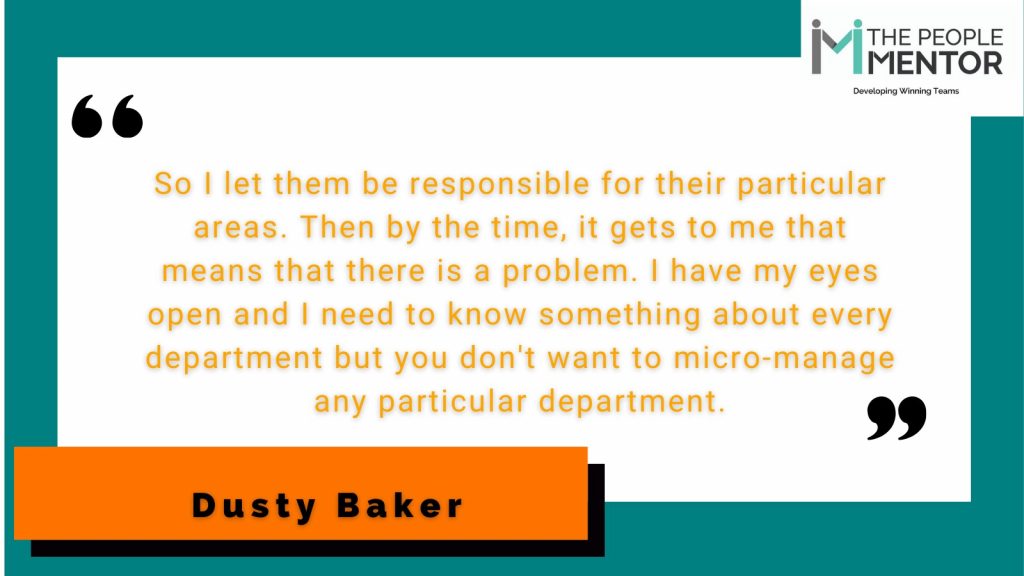Are you sitting comfortably? Welcome to my series of podcasts that will help you to navigate those inevitable difficult events at work that are part of being a small business owner.
Today I want to talk about how micromanaging, and how to stop it.

Are you never quite satisfied with your employees’ work?
Are you always telling people that you would have gone about something differently?
Are you virtually sitting on your employees’ shoulders, scrutinising what they’re doing?
If so, the chances are that you’re a micromanager.
No employee wants a manager they feel doesn’t trust them to do their job; it can be very demoralising and it affects motivation which in turn will affect productivity.
I’m not saying that making sure the job gets done is a bad thing, but if you spend all of your time and energy on the small stuff, you’ll lose sight of your priorities. You could be focusing on the things that are ultimately going to help your business grow. And the other issue is that by micromanaging every last detail, you’re creating dependence.
How are you ever going to have the freedom you wanted when you became self-employed if no aspect of your business can run without you?
So how can you stop micromanaging?
Realising that you might be the problem is the first step to changing your behaviour and the way you think and feel about delegating and interacting with your employees. Follow these steps to get back on track:
Think about why you micromanage. Insecurity about your ability to be an effective manager or a lack of confidence in your employees to get things done might be one of the main reasons you micromanage.
Do you fear delegating things to others because you think nobody will do the job as well as you?
Do you have to control everything, all of the time?
Once you have taken a look at your business (or asked a business mentor or coach to do so impartially) and answered these questions truthfully, then you can start finding solutions that might be as simple as working on your confidence so you can be a more effective manager.
Next, hire good people.
This is important. If your employees aren’t a good fit for your business or they aren’t confident in their ability to do a good job, no wonder you want to micromanage them every minute of the day. Hire people who are a good fit for your business, in terms of qualifications, experience, and personality. And take the time to notice any rising stars among your employees, they might just be the perfect candidate to delegate work to.
Speaking of delegation, the next point is to learn how to delegate!
As a small business owner, you probably aren’t averse to getting your hands dirty, but remember that you can’t possibly do everything on your own, especially as your business grows. Delegation is about identifying the tasks you can no longer afford to spend time on and giving them to someone with the relevant skills. If it’s a specialist task, another option is to outsource it if you can afford it.
The next step is to learn to let go and give your employees some autonomy. They might not approach things the same way as you, but sometimes you have to just trust that they will step up and get the job done. This will be tough at first, but you’ll soon see that it frees you up to do the more important things and you’ll wonder why you didn’t do it sooner.
The other benefit of giving employees some leeway is that it strengthens the team. If they’re given the chance to contribute ideas, work independently, or find solutions to problems, they’ll feel empowered as well as more engaged and motivated. Accept that they might make mistakes and that there may be some teething problems as they deal with their newfound freedom, but you’re helping them build their skills, boosting morale, and giving yourself the freedom to actually run and grow your business.
If you have been micromanaging for a while, even without realising it, it might be difficult to get used to letting go of the reins at the beginning. I understand.
Your business is your baby, and you’ve built it from scratch. But when you think about it, is it not better to build a confident, motivated, and loyal team who will help you achieve business success than to burn yourself out, believing that you and only you can keep your business going?
Struggling with how to move from micro-managing to giving your team empowerment then I can help you.
I hope that you got some good tips from today’s podcast, and I’ll see you next time for the next one in the series. This is The People Mentor, signing off.
Read more about delegation in the blog here




